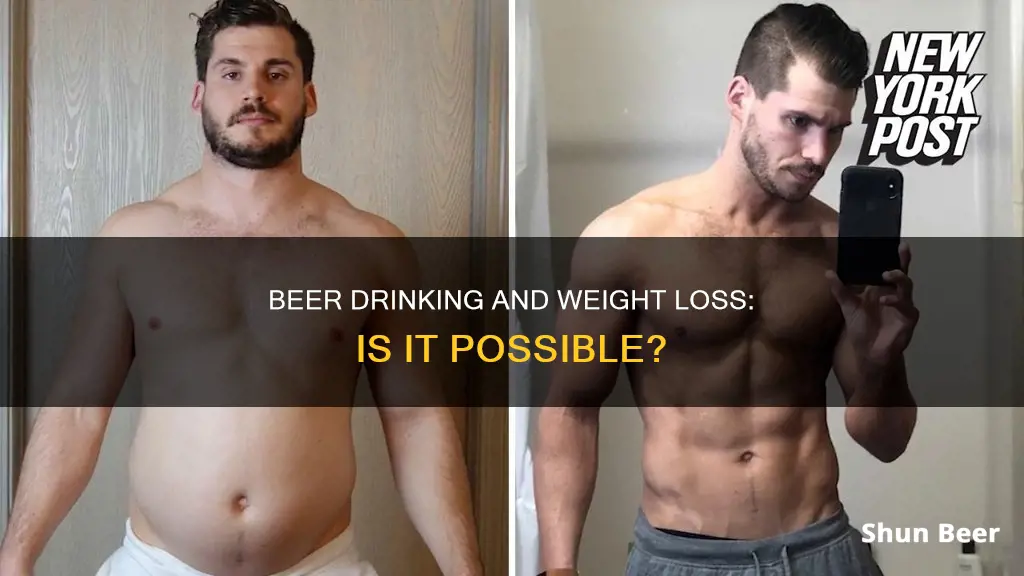
Drinking beer and losing weight is a challenging combination. Beer is often associated with weight gain, as it provides empty calories without satisfying hunger. Alcohol also negatively affects sleep, increases appetite, and disrupts metabolism, making weight loss more difficult. However, it is possible to enjoy an occasional beer while losing weight by practising moderation and choosing lower-calorie options.
| Characteristics | Values |
|---|---|
| Calories | Beer contains calories, with most regular 12-ounce beers containing around 150 calories per serving. |
| Empty Calories | Beer is considered an "empty calorie" drink as it provides almost no nutrients. |
| Liquid Form | Beer is a liquid, meaning it is easy to consume calories quickly. |
| Alcohol Content | The alcohol content in beer is expressed as a percentage of alcohol by volume (% ABV). The higher the ABV, the higher the calories. |
| Calorie Tracking | It can be challenging to determine the exact calorie content of beer as it is not required to be listed on containers. |
| Sleep | Beer consumed at night can negatively impact sleep quality, which is linked to weight gain and muscle loss. |
| Self-Control | Beer can inhibit self-control, leading to increased food consumption and potential weight gain. |
| Strategies | Strategies for drinking beer while losing weight include limiting the number of beers, choosing lower-calorie options, reducing portion sizes, and drinking less frequently. |
| Weight Gain | Drinking beer can contribute to weight gain, particularly when paired with high-calorie foods. |
| Moderation | Moderation is key; drinking in moderation and being mindful of calories can help prevent weight gain. |
What You'll Learn

Beer is an empty calorie as it provides almost no nutrients
Beer is often referred to as "empty calories" because it provides almost no nutrients to the body. While beer is made from cereal grains like barley, during the fermentation process, much of the carb content is converted to alcohol. As a result, beer is primarily water by weight and volume, with most of the calories coming from alcohol, and a small contribution from unfermented carbs and protein.
The issue with "empty calories" is that they provide energy without any nutritional benefit. This can hinder weight loss because, to lose weight, an individual must eat fewer calories than they burn while staying full. Whole foods like meat, vegetables, and fruits are effective for weight loss because they fill you up while providing fewer calories. On the other hand, drinking beer can make you feel full, but the calories from the beer are not providing any nutritional value.
Additionally, the alcohol in beer is metabolized differently by the body compared to other macronutrients. Alcohol can stop the process of fat burning completely, and because it is a quicker, more accessible form of energy for the body to use compared to fat, your body will always opt for burning alcohol before fat. This means that any excess calories from the beer or other foods consumed will be stored as fat.
Furthermore, the liquid form of beer means that calories can be consumed very quickly, and the alcohol content can negatively affect sleep, leading to weight gain and muscle loss. Thus, while it is possible to drink beer and still lose weight, it is important to be mindful of the number of beers consumed and to adjust eating habits accordingly. Moderation is key, and picking healthier drink options, hydrating, and maintaining a balanced diet and workout routine can help individuals achieve their weight loss goals while still enjoying an occasional beer.
Drink Warm Beer? The Pros and Cons Explained
You may want to see also

Drinking alcohol can stop the process of fat burning
Alcohol is a source of empty calories. Drinking alcohol can stop the body from burning fat completely. This is because the body treats alcohol as a toxin, and removing it becomes the top priority. This means that the body will stop burning its usual stored carbs and fat for energy and will instead utilise the alcohol. Any other calories taken in, whether from food or more drinks, will end up as stored fat.
The average man needs an hour to metabolise 0.6 ounces of alcohol, the amount in one drink. So, even a couple of drinks can have a dramatic effect. In a study from the University of California, Berkeley, people who drank two cocktails showed a 73% decrease in fat burning after two hours.
Alcohol also has a high caloric content. Beer, in particular, can contribute a lot of calories, making it challenging for those trying to manage their weight. Beer is also an "empty calorie" because it provides almost no nutrients. It is also in liquid form, which means you can drink calories very quickly.
If you are trying to lose weight, it is harder to create a caloric deficit if you drink every day. However, this does not mean that you have to cut alcohol out of your life entirely. Moderation is key.
Strategies to Help Your Husband Stop Drinking Beer
You may want to see also

Beer may negatively affect your sleep
A study from the University of Michigan Alcohol Research Center found that heavy drinkers sleep less than non-drinkers (43 minutes less per night) and that the sleep they do get is of inferior quality. During deep sleep, your body carries out a series of restorative hormonal and metabolic functions. Without it, your energy system can misfire, causing you to feel hungry when you don't need food, and make poor diet choices. In a French study, people consumed 560 more calories during the day following a night of poor sleep than they did after sleeping eight hours.
Lack of quality sleep is directly linked to both weight gain and muscle loss. A weight loss study found that people who slept for 5.5 hours lost 50% of their weight from muscle, compared to those who slept for 8.5 hours. Another study found that sleep-deprived people experienced a 45% increase in appetite for high-carbohydrate, calorie-dense foods.
Sleep is also important for your activity levels and the quality of your workouts. If you are well-rested, you are more likely to have a better workout.
Beer and Keto: A Match Made in Heaven?
You may want to see also

Beer may inhibit your self-control
Beer is deeply ingrained in our culture as a way to unwind, have fun, and relax. However, when it comes to weight loss, it can be challenging due to its high calorie and carbohydrate content. One of the reasons beer can hinder weight loss is its effect on self-control.
Alcohol has been shown to lower inhibitions and impair judgement. This can lead to decreased self-control, especially when it comes to food choices. When drinking beer, individuals may find themselves eating more than they normally would or making less healthy food choices. This can derail their weight loss efforts and make it difficult to stick to a healthy diet.
The impact of beer on self-control is particularly notable when combined with food. For example, if an individual is having a burger and a few beers, they may be more likely to also order fries or other high-calorie sides. This is because alcohol can lower inhibitions and make it harder to resist tempting food options.
Additionally, beer is often consumed in social settings, such as going out with friends. In these situations, individuals may be more likely to indulge in high-calorie foods and drinks, further impacting their self-control and weight loss efforts.
To mitigate the impact of beer on self-control, it is important to practise moderation. Limiting the number of beers consumed per week and being mindful of eating habits while drinking can help individuals maintain self-control and stay on track with their weight loss goals.
In conclusion, while beer may inhibit self-control, particularly when combined with food or social settings, individuals can still enjoy beer in moderation while working towards their weight loss goals. Practising portion control, choosing lower-calorie options, and being mindful of food choices while drinking can help individuals maintain self-control and achieve their desired results.
Gluten Allergy and Beer: What's Safe to Drink?
You may want to see also

Beer is often paired with eating high-calorie foods
Beer is also often associated with socialising and relaxing, and it is common to drink beer while eating high-calorie snacks like Buffalo wings, French fries, nachos, and chips. This combination of beer and high-calorie food can be detrimental to weight loss goals, as the body will store excess energy as fat.
In addition, drinking alcohol can negatively impact sleep quality, and lack of quality sleep is directly linked to weight gain and muscle loss. Poor sleep can also increase appetite, particularly for high-carbohydrate, calorie-dense foods. Therefore, if weight loss is the goal, it is important to be mindful of both beer consumption and the types of food consumed alongside it.
To reduce the impact of beer on weight loss, it is recommended to drink light or low-percentage ABV beers, reduce portion sizes, and drink less frequently. It is also important to be mindful of overall calorie intake and to ensure that beer consumption aligns with a balanced diet and healthy lifestyle.
Beer's Power: Removing Trapped Gas, Always
You may want to see also
Frequently asked questions
Yes, it is possible to drink beer and lose weight, but it is harder to create a caloric deficit if you drink every day. The key is moderation.
Beer can contribute a lot of calories, and it is in liquid form, which means you can drink calories very quickly. Beer also contains alcohol, which is metabolised differently by the body compared to other macronutrients. Drinking alcohol can stop the process of fat burning completely.
Here are some strategies to minimise the impact of beer on your weight loss goals:
- Drink light or low % ABV beer.
- Reduce your portion size by using a smaller glass or choosing a 12-ounce can instead of a 16-ounce bottle.
- Drink less frequently, such as only on weekends.
- Choose lower-carb beers.
- Alternate every alcoholic drink with a glass of water.
- Avoid eating high-fat or high-calorie foods while drinking.







